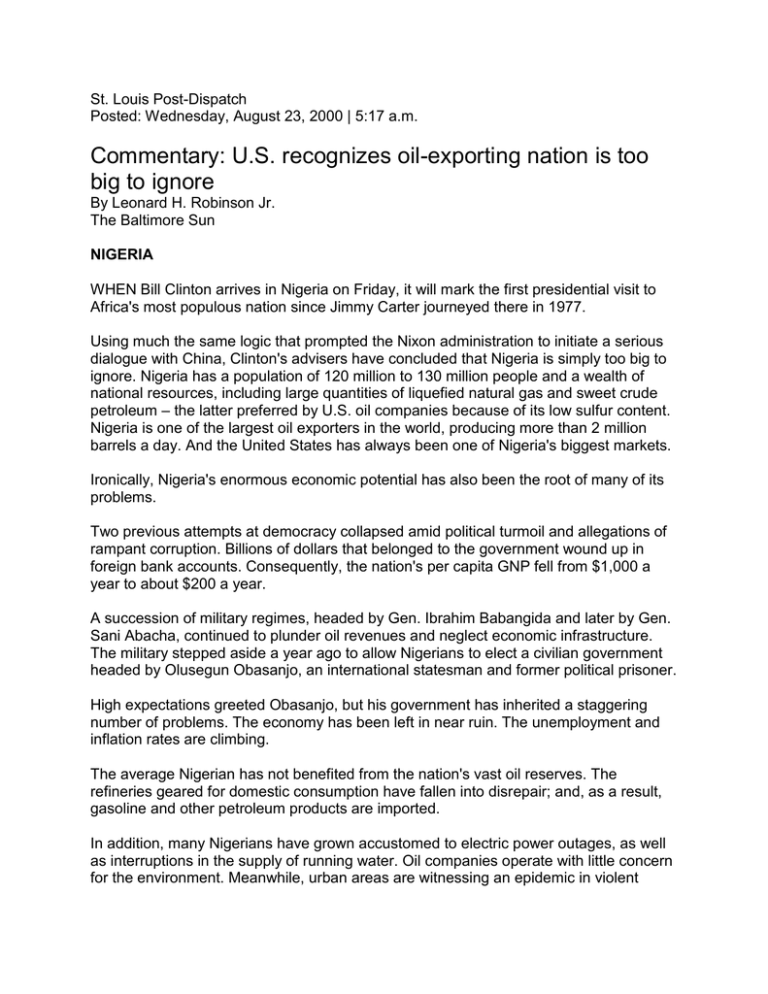Nigeria - Important in Africa
advertisement

St. Louis Post-Dispatch Posted: Wednesday, August 23, 2000 | 5:17 a.m. Commentary: U.S. recognizes oil-exporting nation is too big to ignore By Leonard H. Robinson Jr. The Baltimore Sun NIGERIA WHEN Bill Clinton arrives in Nigeria on Friday, it will mark the first presidential visit to Africa's most populous nation since Jimmy Carter journeyed there in 1977. Using much the same logic that prompted the Nixon administration to initiate a serious dialogue with China, Clinton's advisers have concluded that Nigeria is simply too big to ignore. Nigeria has a population of 120 million to 130 million people and a wealth of national resources, including large quantities of liquefied natural gas and sweet crude petroleum – the latter preferred by U.S. oil companies because of its low sulfur content. Nigeria is one of the largest oil exporters in the world, producing more than 2 million barrels a day. And the United States has always been one of Nigeria's biggest markets. Ironically, Nigeria's enormous economic potential has also been the root of many of its problems. Two previous attempts at democracy collapsed amid political turmoil and allegations of rampant corruption. Billions of dollars that belonged to the government wound up in foreign bank accounts. Consequently, the nation's per capita GNP fell from $1,000 a year to about $200 a year. A succession of military regimes, headed by Gen. Ibrahim Babangida and later by Gen. Sani Abacha, continued to plunder oil revenues and neglect economic infrastructure. The military stepped aside a year ago to allow Nigerians to elect a civilian government headed by Olusegun Obasanjo, an international statesman and former political prisoner. High expectations greeted Obasanjo, but his government has inherited a staggering number of problems. The economy has been left in near ruin. The unemployment and inflation rates are climbing. The average Nigerian has not benefited from the nation's vast oil reserves. The refineries geared for domestic consumption have fallen into disrepair; and, as a result, gasoline and other petroleum products are imported. In addition, many Nigerians have grown accustomed to electric power outages, as well as interruptions in the supply of running water. Oil companies operate with little concern for the environment. Meanwhile, urban areas are witnessing an epidemic in violent crime. Ethnic and religious tensions continue, with extremists responsible for communal violence. Despite these problems, Nigeria's importance to the United States and sub-Saharan Africa cannot be diminished. If Africa is to turn the corner politically and economically, Nigeria must be at the forefront. DURING the 1990s, when civil war devastated Liberia and then Sierra Leone, Nigeria committed its troops to the regional peacekeeping force. They were on the front lines during the most desperate times, giving diplomats time to make peace. In the past decade, Nigeria has expended more than $10 billion in peacekeeping activities in Liberia and Sierra Leone -- an extraordinary investment in the stability of the region, and a clear sign of political maturity and a sense of responsibility as a regional power. Nigeria has spent more on international peacekeeping operations than the United States, Britain, France or any of the other Western industrial powers. When Western European powers were debating whether to send troops to end the conflicts in Bosnia and Kosovo, Nigerian peacekeepers were at work in West Africa. Nigerian troops helped overturn a coup in Sierra Leone, reinstalling that country's democratically elected government and preventing the ruthless Revolutionary United Front rebels of Foday Sankoh from taking over. Simply put, the Nigerians have done what the United States and other members of the international community have been reluctant to do. There are no easy solutions to Nigeria's problems. But the United States can provide a helping hand with a series of policy moves aimed at helping to jump-start the economy. These range from debt relief and short-term loans to providing the expertise necessary to help Nigeria build the infrastructure -- roads, electrical system, telephone service and water -- necessary to bring it into the new century. Perhaps one of the most important things the United States can do is to help the Obasanjo government reverse the trend that has sent the best and brightest Nigerians fleeing to the United States and elsewhere. If economic conditions improve in Nigeria, many Nigerians who have made their mark abroad as doctors, engineers and business people may decide to return home and bring their skills with them. It is hoped that Clinton's visit will not only signal the start of a new relationship between the United States and Nigeria, but also send a signal to successful Nigerians who are living in this country and elsewhere. Leonard H. Robinson Jr., president and chief executive officer of The National Summit on Africa, is a former deputy assistant secretary of state for African affairs.



